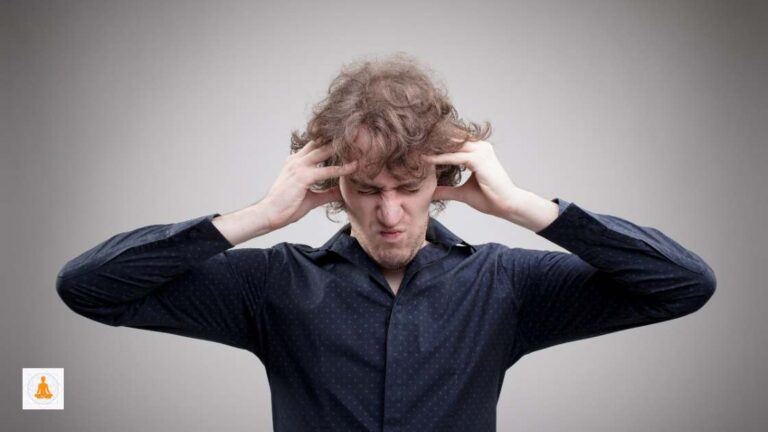Meditation is known for its great benefits like lowering stress and anxiety and improving your mood and mental sharpness. But there’s a question people rarely ask: can meditation be dangerous? While many people find calm and balance through meditation, it’s important to know it can have some downsides too. This post will look at the less talked about risks of meditation, such as mental distress, physical discomfort, and spiritual challenges. By being aware of these potential issues, you can make smart choices and practice meditation safely and effectively.
The Dark Side of Meditation
While meditation has many benefits, it’s important to understand the potential risks. Let’s look at some of the less-known challenges that can come with meditation.
Psychological Distress
- Meditation is often seen as a way to improve mental health, but it can sometimes make things worse.
- Sitting quietly and focusing inward can bring up unresolved emotions and thoughts, leading to increased anxiety, panic attacks, or feelings of depression.
- This can be especially tough for beginners without proper guidance.
- It’s important to know that meditation can sometimes cause psychological distress, and having mental health support can be very helpful.
Physical Discomfort or Pain

- Physical pain is another common issue in meditation. Sitting for long periods, especially in cross-legged positions, can cause back pain, knee pain, and stiff joints.
- Poor posture during meditation can cause various physical problems. Slouching or hunching over can strain the spine, leading to chronic back pain.
- Incorrect alignment of the neck and shoulders can cause tension headaches and shoulder stiffness.
- Using cushions or chairs for support can also help reduce physical discomfort. Listen to your body and adjust your position to avoid pain.
Triggering Past Traumas
- For people with a history of trauma, meditation can sometimes bring back painful memories, a phenomenon known as “retraumatization.”
- Focusing inward can cause past traumas to resurface, which can be overwhelming. If you have a traumatic history, approach meditation carefully and consider seeking help from therapists who understand trauma-informed mindfulness practices.
Hyperventilation or Dizziness
- Some meditation techniques involve deep or rapid breathing exercises, which can lead to hyperventilation or dizziness.
- Changes in breathing patterns can disrupt the balance of oxygen and carbon dioxide in your body, causing lightheadedness or faintness. This is especially common for beginners who might not be familiar with proper breathing techniques.
- To prevent this, practice breath control exercises slowly and with guidance from a knowledgeable instructor.
- If you experience dizziness or hyperventilation, return to normal breathing and take a break from the practice to restore balance.
Anxiety or Panic Attacks
- Meditation is often recommended for anxiety relief, but it can sometimes cause or worsen anxiety and panic attacks.
- Sitting quietly and looking inward can be overwhelming as this increased self-awareness might trigger anxiety, especially if you’re not ready to face your inner thoughts.
- Beginners might feel more anxious during meditation, which can be discouraging. To avoid this, start with short sessions and gradually increase the time as you get used to the practice.
Depression & Feelings of Detachment

- Meditation can also lead to feelings of depression or emotional detachment.
- The introspective nature of meditation might make some people feel isolated or emotionally numb.
- This detachment can sometimes be mistaken for progress, but it might actually be a sign of deeper psychological issues.
- Symptoms of depression include a lack of motivation, persistent sadness, and not enjoying activities you used to like.
- It’s important to keep an eye on your emotional health and seek professional help if you notice signs of depression.
“Spiritual Bypassing” – Avoiding Unresolved Issues
- “Spiritual bypassing” happens when people use meditation to avoid dealing with unresolved emotional or psychological issues.
- Instead of addressing these problems, they might use meditation to escape or suppress them.
- This can create a false sense of well-being without solving the underlying issues. Over time, these unaddressed problems can come back even stronger.
- It’s important to balance meditation with other psychological work, like therapy, to ensure true emotional health.
Identity Crises or Existential Angst
- Meditation involves deep self-reflection, which can sometimes lead to an identity crisis or existential angst.
- As you explore your inner self, you might start questioning your beliefs, values, and sense of identity.
- This can be confusing and disorienting, causing you to wonder about the meaning of life, your purpose, and your place in the world.
- To handle these feelings, it’s helpful to approach meditation gradually and seek support from experienced teachers or therapists.
Misinterpreting Mystical Experiences
- Meditation can sometimes lead to mystical experiences like visions, profound insights, or feelings of unity with the universe.
- While these experiences can be meaningful, they can also be misinterpreted. You might place too much importance on these events or see them as signs of spiritual superiority, which can distort your understanding of meditation’s true purpose.
- Misinterpretation can also lead to unrealistic expectations or disappointment if such experiences don’t happen often.
- It’s important to stay grounded and recognize that mystical experiences are just one part of meditation, not the ultimate goal.
Overdependence on Meditation
- While meditation is a great tool for managing stress and improving well-being, relying on it too much can be a problem.
- Using only meditation for coping might lead to neglecting other important parts of mental and emotional health care, like therapy, social support, and physical activity.
- It’s best to use meditation as part of a balanced approach to health. Mixing different coping strategies can create a more effective plan for overall well-being.
Insights from Mental Health Experts on Meditation Risks

- Mental health experts acknowledge that while meditation has many benefits, it can also pose risks, especially for those with existing mental health conditions.
- Research shows that meditation can sometimes worsen symptoms in people with anxiety, depression, or PTSD.
- Experts recommend that individuals with these conditions approach meditation carefully and seek guidance from trained professionals.
- Tailored approaches, such as trauma-informed mindfulness, can help provide a safer meditation experience.
Final Thoughts
Meditation is a powerful tool that can greatly benefit your mental, physical, and spiritual well-being. However, it’s important to be aware of the potential risks involved. By understanding the possible psychological, physical, and existential challenges, you can practice meditation more safely and effectively.
The key to successful meditation is informed practice. Learn about different techniques, pay attention to your body and mind, and seek help from qualified instructors or mental health professionals if needed. Balance meditation with other self-care activities for a holistic approach to your well-being.
By approaching meditation with awareness and caution, you can enjoy its many benefits while minimizing risks. Embrace meditation with an open heart and a mindful attitude, and let it enhance your life in meaningful and lasting ways.

